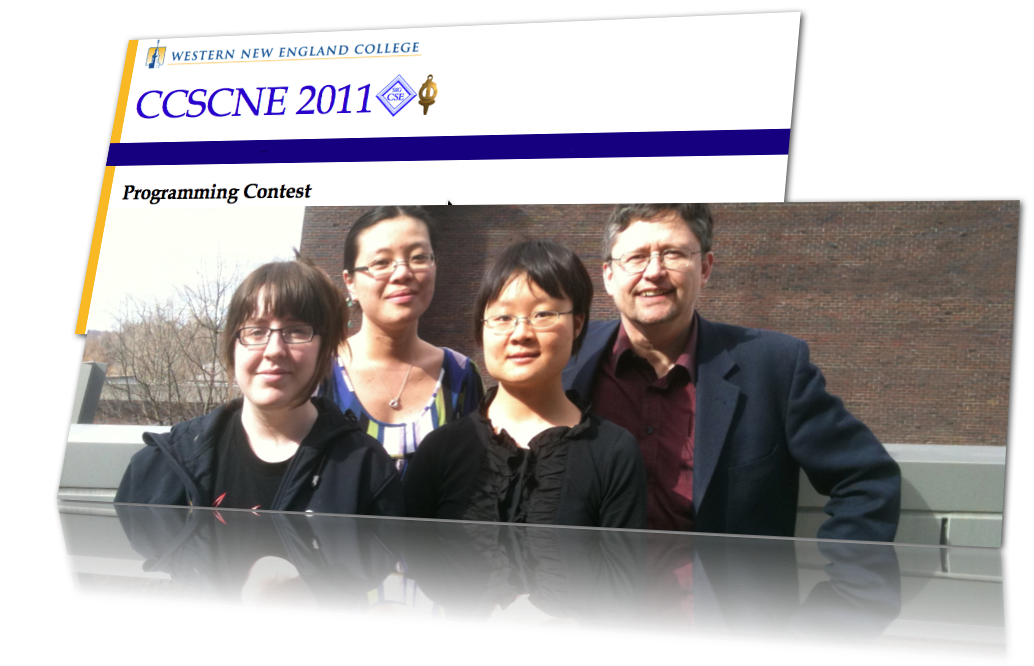Programming Contest 2011
The TEAM
- Julia Burch, '11
- Janet Guo, '12
- Yang Li, '11
- (chauffeur: Dominique Thiebaut)
Contest Web Page
Dates
- April 15th 9am - Noon. The contest is held concurrently with the conference workshops and before the paper sessions.
- Detailed Timeline
- 7:45 - 8:45 a.m. Breakfast and Registration of Teams and Team Members Registration Area
- 7:45 - 8:45 a.m. Computers available for practice TBA
- 8:45 - 9:00 a.m. Initial Meeting and Presentation of the Problems TBA
- 9:00 a.m. - Noon Contest TBA
- Noon - 12:45 p.m. Luncheon for Programming Teams TBA
- 7:00 - 9:00 p.m. Dinner / Announcement of Contest Winners TBA
- Detailed Timeline
Details
- The programming languages for the contest are Java and C/C++.
- Rules for the contest are similar to the ACM Programming Contest.
- The winners of the contest will be announced at the Conference Banquet.
- A trial website will be made available a month before the contest so teams can familiarize themselves with the contest shell.
Rules
These are the ACM Programming Contest Rules. The rules from the CCSCNE contest differ in a few ways, notably the length of time: 3 hours instead of 5. The text below is taken from http://en.wikipedia.org/wiki/ACM_International_Collegiate_Programming_Contest
The ICPC is a team competition. Current rules stipulate that each team consist of three students. Participants must be university students, who have had less than five years of university education before the contest. Students who have previously competed in two World Finals or five regional competitions are ineligible to compete again.[1][2]
During contest, the teams are given 5 hours (3 for the CCSCNE contest) to solve between 8 and 12 programming problems (with 8 typical for regionals and 10 for finals). They must submit solutions as programs in C, C++, or Java. Programs are then run on test data. If a program fails to give a correct answer, the team is notified about that and they can submit another program.
The winner is the team which correctly solves most problems. If necessary to rank teams for medals or prizes among tying teams, the placement of teams is determined by the sum of the elapsed times at each point that they submitted correct solutions plus 20 minutes for each rejected submission of a problem ultimately solved.
For example, consider a situation when two teams, Red and Blue, tie by solving two problems each. The team Red submitted their solutions to A and B at 1:00 and 2:45 after the beginning of the contest. They had a rejected run on C, but it was ignored since they didn't solve C. The team Blue submitted solutions to problems A and C at 1:20 and 2:00 after the beginning. They had one rejected run on C. Then, the total time is 1:00+2:45=3:45 for team Red and 1:20+2:00+0:20=3:40 for team Blue. The tie is broken in favor of Team Blue.
Compared to other programming contests (for example, International Olympiad in Informatics), the ICPC is characterized by a large number of problems (8 or more problems in just 5 hours). Another feature is that each team can use only one computer, although teams have three students. This makes the time pressure even greater. Good teamwork and ability to withstand pressure is needed to win.
Resources
- Taken from the Algorithmist
- http://uva.onlinejudge.org/ - The Valladolid University Online Judge. Over N problems, for a reasonable value of N. The problems are culled from old contests, and online contests.
- http://acmicpc-live-archive.uva.es/nuevoportal/ - The 2000's ACM-ICPC Live Archive Around the World. Contains actual problems from regionals and finals from 2000 on.
- http://www.topcoder.com - Weekly programming competitions from algorithms to components to marathons.
- http://mathschallenge.net/index.php?section=project - Project Euler consists challenging mathematical or computer science problems.
- http://spoj.sphere.pl - One of the earliest judges with many support for many different languages.
